At Conclusion of World Junior Championships, Team USA Leaves Inspired
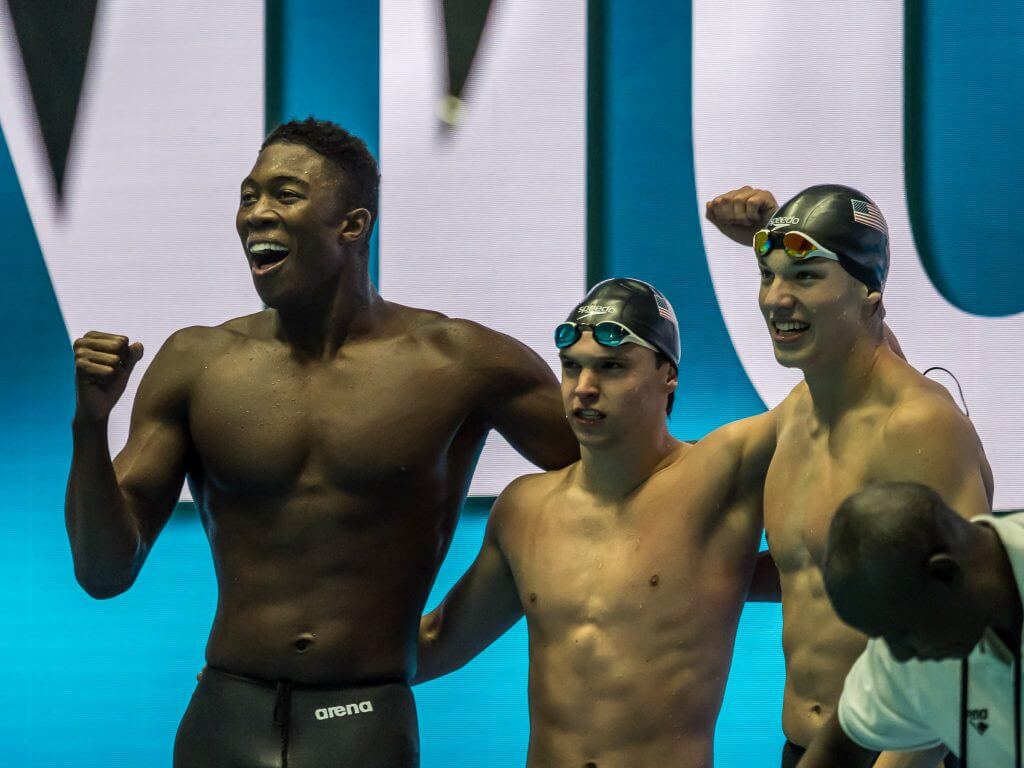
By David Rieder.
The World Junior Championships exist to prepare athletes for senior level competitions—the World Championships, the Olympics, etc. Medals are great but a secondary concern. More than anything else, the goal is to learn.
“You always want to swim fast, and that is certainly a priority,” U.S. men’s head coach Bruce Gemmell said. “But I think just as important is learning the international way of doing things, getting the international experience, being around people who don’t speak your language. Some of the protocols are different with FINA, so I think that’s important.”
No problem with that—it would not be called the World “Junior” Championships if the this was the be-all, end-all for the swimmers competing. But in the moment, on the final night of the meet, medals meant everything.
In 11 finals, American swimmers won ten medals, including twice finishing 1-2. More than they had all week, the American team caught fire.
Zoe Bartel and Ella Nelson delivered the first 1-2 in the women’s 200 breast, both using strong back halves to get past early leader Mona McSharry. You think either will be forgetting the moment right after they finished, when Bartel showed surprising regard for the integrity of the lane line as she swam underwater from lane four to lane three to embrace Nelson?
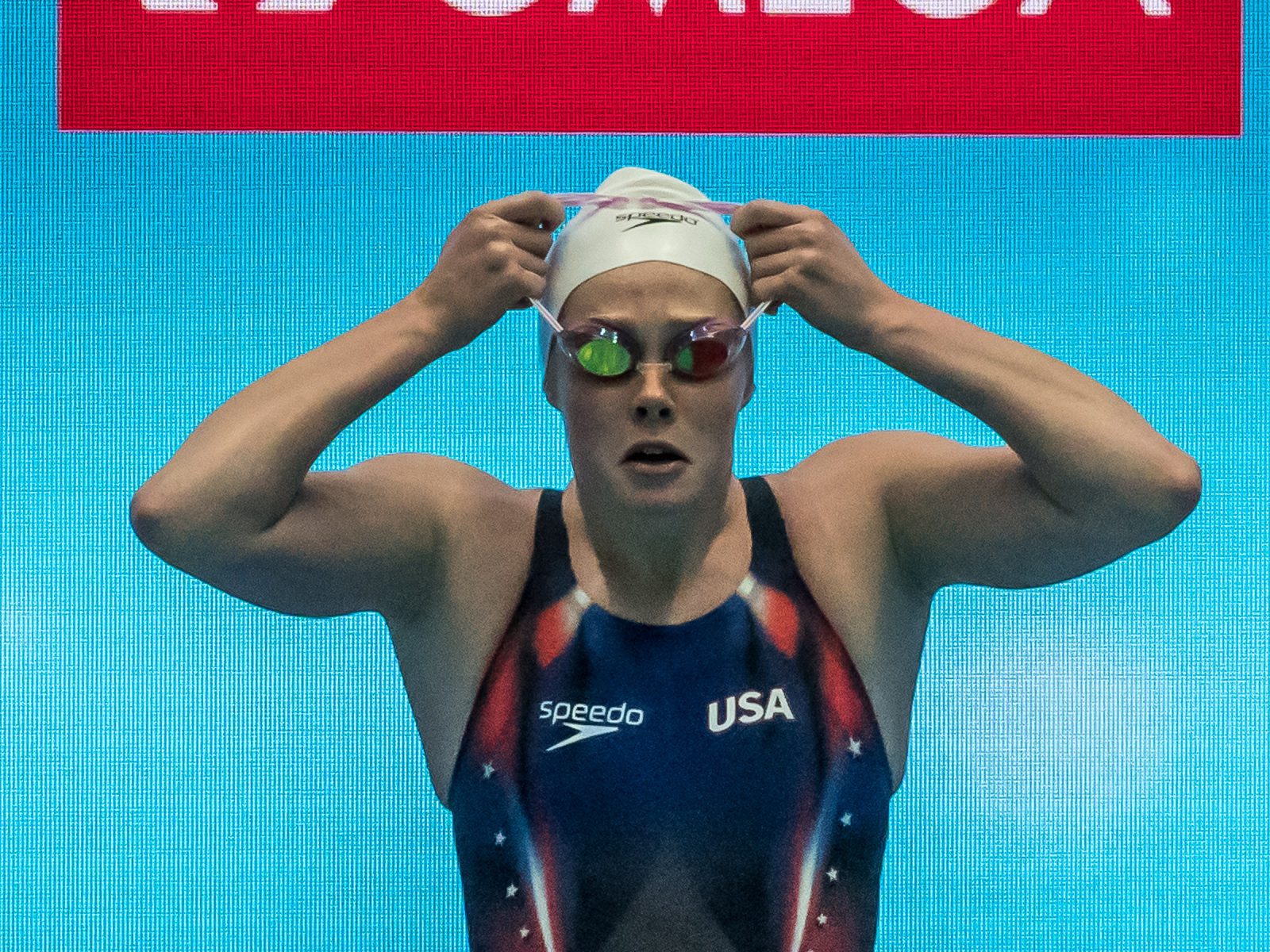
Ella Nelson — Photo Courtesy: Peter H. Bick
“In the ready room and actually after prelims, Zoe and I said, ‘How cool would this be to go 1-2 for the team?’” Nelson said. “In the ready room, I gave her a double high-five and said, ‘Let’s do this.’”
There’s a reason Nelson was able to cut another three tenths off her best time after dropping more than three seconds at U.S. Nationals in late June—the opportunity to do something great for Team USA had inspired her.
“Getting back to training after Nationals, I really just put my head down and got to it and knew that I really needed to do something great for the team. I think that was the biggest thing, knowing I was doing it for something bigger than myself.”
A few minutes later, Andrew Abruzzo won his third gold medal of the week in the men’s 1500 free, and in a furious finish, teammate Michael Brinegar held off Russia’s Iaroslav Potapov for second by 0.18.
Abuzzo had shared the podium with teammate Trey Freeman after his 400 free and with Brinegar after his gold in the 800 free, but both of those medals had been bronze, not silver. This one was even sweeter.
“It was surreal,” Abruzzo said of his celebration with Brinegar after the race. “That’s what everyone dreams of, having your teammate right beside you and both going best times.
The individual swim that might have captivated the team more than any other was the 15-year-old competing in the final of the men’s 200 back: Carson Foster.
The “Kid”
Two weeks earlier, Foster had starred at U.S. Junior Nationals in New York, winning four events and breaking 2:00 for the first time in the 200 back (1:59.13). And then, two days before he was originally scheduled to make his World Juniors debut, the U.S. coaches inserted Foster onto the 800 free relay for prelims action—and he split 1:48.03.
That earned him a spot on the finals’ squad, and he was only two tenths slower, and he experienced the medal podium for the first time that night as the Americans took silver, one hundredth behind Hungary.
Heading into his 200 back, Foster’s teammates expected a big effort, and he had even captured the attention of arguably the greatest backstroker ever: Aaron Peirsol.
“He’s my idol,” Foster said. “Finally meeting him, I came off the elevator and saw him, and I stopped. I was star-struck. To be able to shake his hand and talk to him a little bit and introduce myself to him, it was just an unbelievable feeling, and it gave me a ton of confidence.”
Aside from his American teammates, who endearingly referred to Foster as “kid,” he had some familiar support in the stands: his teammates from the Mason Manta Rays, including older siblings Jake and Hannah, who made the two-hour drive over from Cincinnati to watch him compete (on a Monday night, no less).
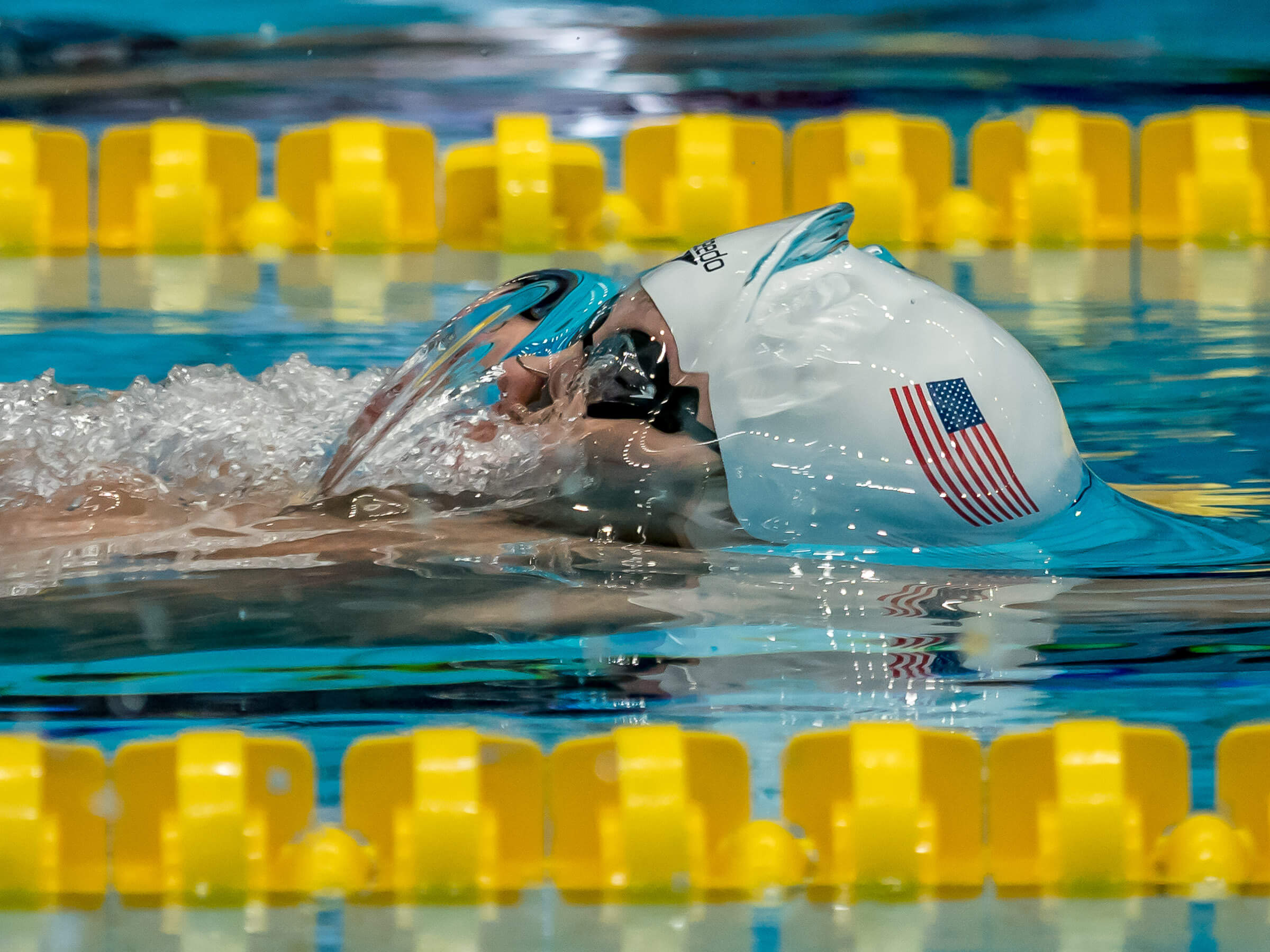
Carson Foster — Photo Courtesy: Peter H. Bick
Think home-country advantage is irrelevant?
He was the top seed coming out of prelims, and Foster defended his turf come the final. He couldn’t keep up with Spain’s Hugo Gonzalez, who won his third gold medal of the week, but Foster managed to take another 1.5 seconds off his best time and get the silver in 1:57.87.
Among American 15-16 boys, that time ranks third all-time. Those faster? Peirsol and Olympic gold medalist Ryan Murphy. And Foster is still 15.
Unfinished Relay Business
As Foster celebrated with his family and friends in the stands, the American team still had some unfinished business to get out of the way: win a relay. They’d come close in the 800 free relay but had not won gold in any of the previous six contested.
“We’ve been trying to get on the top of that podium all week,” backstroker Drew Kibler said. “It’s been a struggle—we’ve had some ups and downs—but the whole theme of this week for Team USA is get better, get better. When other countries start to lose their energy, we stay focused and fight until the end.”
The chances quickly looked slim. Kibler led off in 55.47, a half-second slower than he had swum in the individual 100 back final. Italy had the lead, and the lead was only going to grow with World Junior Record-holder Nicolo Martinenghi swimming the breaststroke.
But the next three Americans, simply put, crushed it. Breaststroker Reece Whitley split 59.32, only two tenths behind Martinenghi. Butterflyer Cody Bybee, a surprise addition to the team, clocked 52.68 on that leg.
But the hopes still looked slim, with Italy still in the lead and Russia anchoring with 100 free World Junior Champion Ivan Girev.
But Matthew Willenbring, who had already dropped an impressive personal-best time of 49.17 to take bronze in the 100 free earlier in the night, did not back down. In fact, with 25 meters to go, he accelerated.
Willenbring came into the wall in 3:36.15, 0.15 ahead of Russia and 0.29 ahead of Italy. He had split a career-best 48.68 on the anchor leg. The Americans had their relay gold.
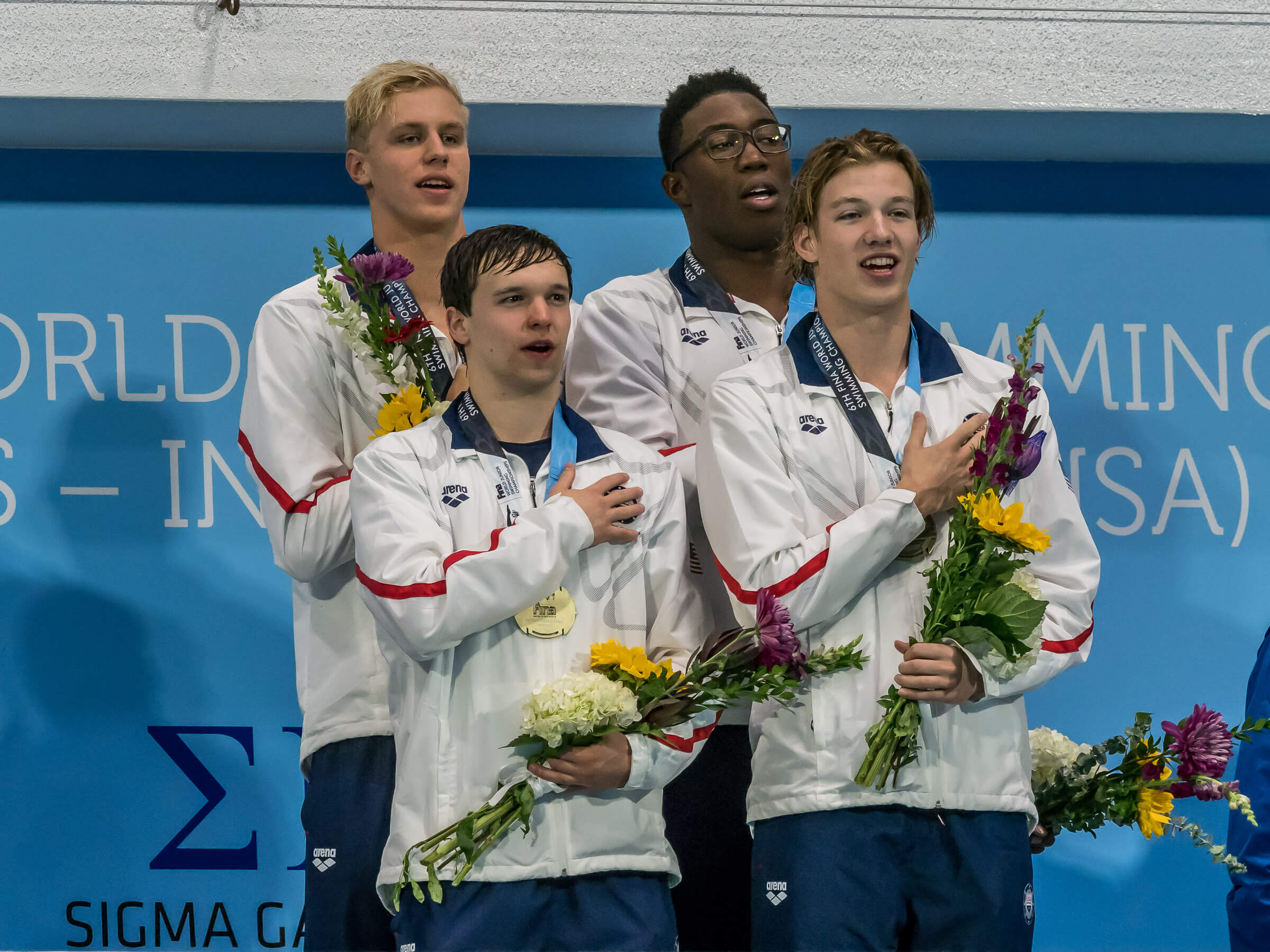
U.S. Men’s 400 Medley Relay — Photo Courtesy: Peter H. Bick
“The last 15, I knew he was going to put his head down,” Whitley said of Willenbring. “He wanted it, just as bad as the rest of us did. I’m so proud of him the way he finished. That’s really not easy to go when the big lights are on. I’m just proud of all three of these boys for putting it all on the line and getting it done.”
Next up, in the final event of the meet, the American women were hoping to follow suit in their medley relay, but the odds were stacked against them—Canada, a team which had dominated the women’s relays all week, would have Olympic medalist Penny Oleksiak going in for the fly leg and Olympic medalist Taylor Ruck for the free.
Regan Smith and Bartel put the Americans more than two seconds ahead at the halfway point, but that’s when Oleksiak went to work reeling in Lucie Nordmann. When Grace Ariola dove in the water for the anchor leg, the lead was merely a half-second.
With Ruck capable of a sub-53 second swim and Ariola having a lifetime-best split of 54.28—which had come the previous night while anchoring the 400 free relay to a silver—the odds were strongly in the Canadians’ favor.
But Ariola was used to those underdog situations, as the medley marked the fourth relay she has anchored for the U.S. team this week, and each time, she had gone up against the Canadian relay juggernaut. She knew Ruck was coming for her, but she kept her composure.
“It was actually really easy,” Ariola said. “I went into it, and I thought, ‘This is my dream. I’ve been dreaming about this moment for a while.’”
Ariola ended up splitting 54.25, once again the best split of her life, but Ruck pulled ahead and touched first in 3:58.38. The Americans finished second in 3:59.19.
Another stellar effort to end a meet full of heroics—including twice swimming three races in one session—but not enough to win gold, and that had Ariola a bit ticked off.
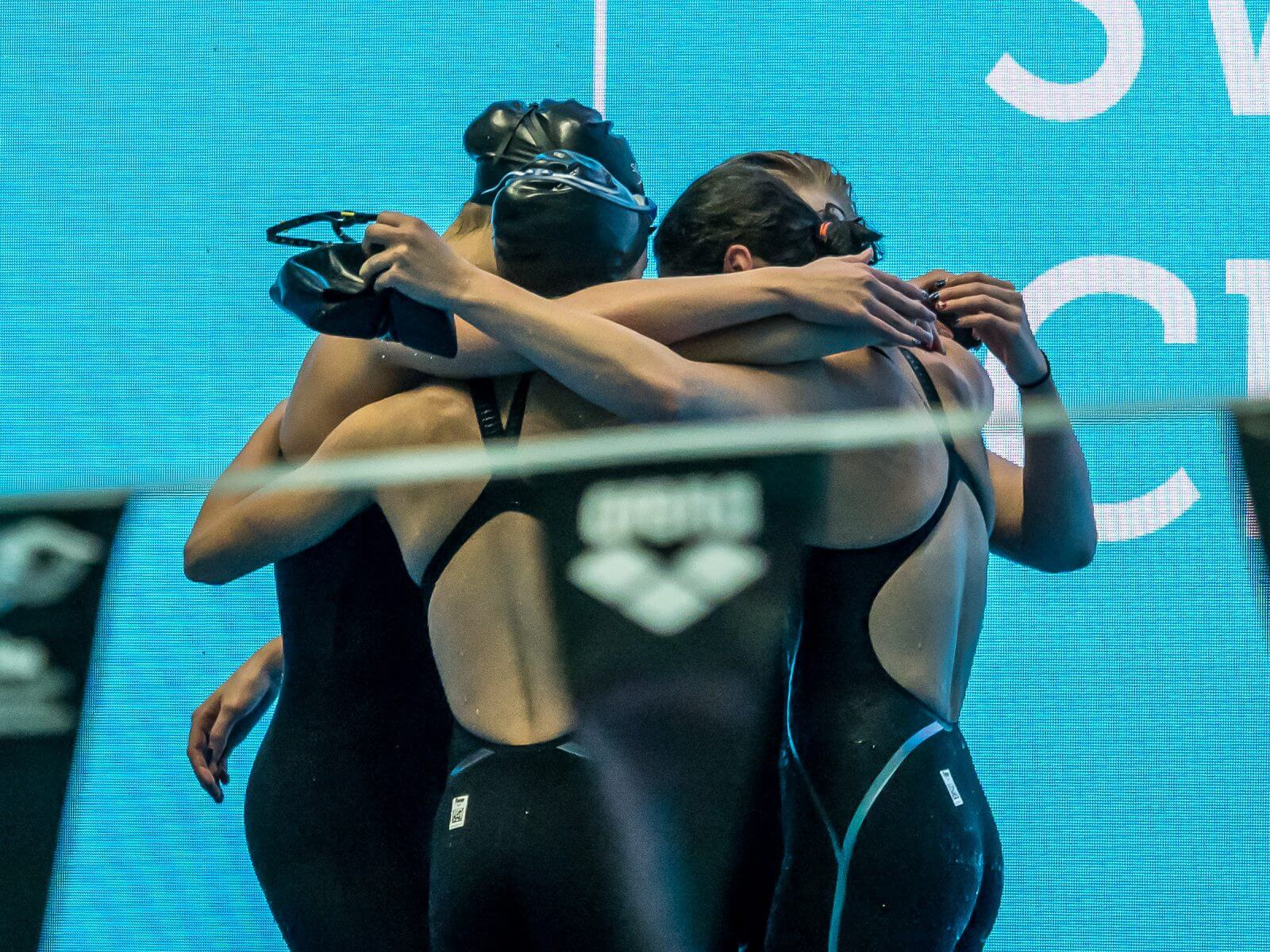
U.S. Women’s 400 Medley Relay — Photo Courtesy: Peter H. Bick
“It didn’t have the outcome that I wanted, which means more fuel to the flames,” she said. “I’ll come back next international meet, and I’ll be hearing the Canadian anthem in my head, and I’ll be thinking, ‘Nah, I’m not going to hear that again.’”
So, yes, Ariola leaves Indianapolis annoyed after she stood on the silver-medal podium in four separate relays and heard “O Canada” play each time. But those aren’t the only memories Ariola will take from this week.
Minutes after she accepted her silver medal from the relay, Ariola joined her four fellow U.S. team captains to accept the award for team of the meet. Behind the blocks, Whitley led a massive huddle of American swimmers and coaches in a chant of “U-S-A.”
From day one, the team’s close bond was evident. The swimmers had arrived in Indianapolis only a couple days before the meet started, yet as soon as it did, teammates were genuinely invested in how others in American flag caps were performing, day in and day out.
“I’ve been to many of these, but right away, it happened,” U.S. women’s head coach Kate Lundsten said of the team chemistry. “It’s like, who did something? Nobody did anything. They just did it as a team, so it was fun to see that.”
“This is the most fun I’ve ever had at a meet in my life,” Ariola said. “I think a lot of other people think the same thing.”
And it’s those memories that Ariola believes will be the motivation for most of their teammates as they return to training in their home clubs in the coming weeks.
Success?
So what makes a World Junior meet successful? Remember, it’s not all about the medals.
“You want to win more medals than everybody else, but when you walk away and the kids are hungry and they want something more, to me that means a successful meet,” Lundsten said.
Her men’s counterpart on the U.S. team, Gemmell, had a different take.
“I think, in a lot of ways, the success can’t be measured until three years down the road. We have some other meet coming up then,” Gemmell said, giving a nod to the 2020 Olympic Games in Tokyo. “Seven years down the road, we have some other meet coming up then.”
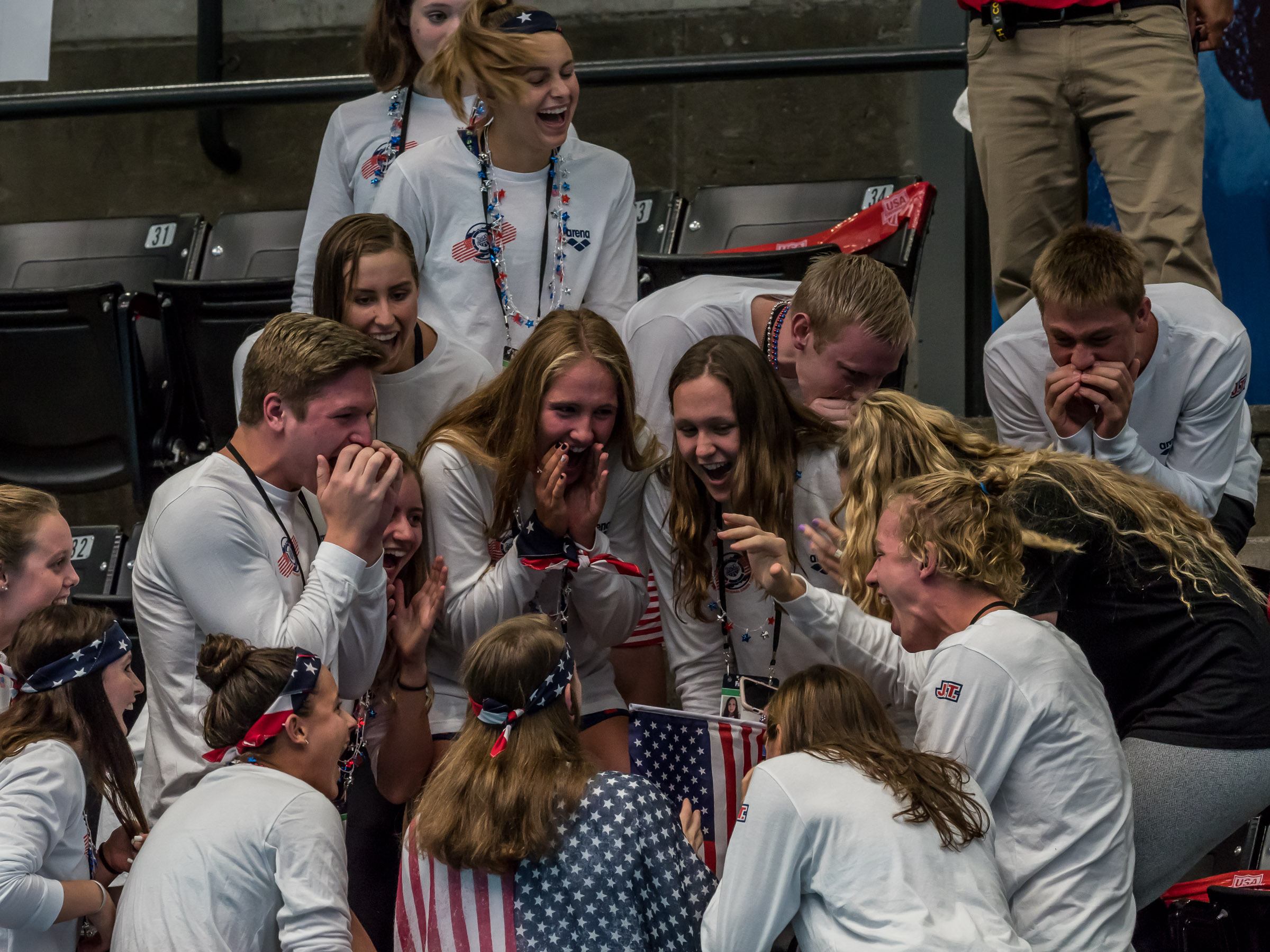
Photo Courtesy: Peter H. Bick
Figuring out the logistics of an international meet? Sure, that’s important, and athletes will remember how they need to handle the ready room and language barriers. But far more critical is how World Juniors introduces athletes to the concept of representing their country—and how that little taste of national pride and unity can inspire them.
Every American athlete this week was downright inspired to be a part of the U.S. national team, to have a chance to swim for something as big as their country. Think back to Bartel and Nelson, or to Abruzzo and Brinegar, or to Foster, the 15-year-old embraced by a veteran team that went out and swam the best race he ever had in the biggest moment of his young career.
What can be more motivating than realizing the potential to again wear the stars and stripes cap, only on a much higher level? Like, say, at the Olympics? That’s the meet where above all else, medals matter. And that’s the destination that the American swimmers who just finished up at the World Junior Championships will eventually aspire to.
And if what happened this week in Indianapolis inspires even some swimmers on this U.S. team in their journey towards becoming Olympians, even Gemmell will look back and consider the meet an enormous success.
.png)
Meet Links
- OFFICIAL MEET PAGE
- EVENT SCHEDULE
- USA ROSTER
- PSYCH SHEET
- LIVE RESULTS
- DAY 1 PRELIMS RESULTS
- DAY 1 FINALS RESULTS
- DAY 2 PRELIMS RESULTS
- DAY 2 FINALS RESULTS
- DAY 3 PRELIMS RESULTS
- DAY 3 FINALS RESULTS
- DAY 4 PRELIMS RESULTS
- DAY 4 FINALS RESULTS
- DAY 5 PRELIMS RESULTS
- DAY 5 FINALS RESULTS
- DAY 6 PRELIMS RESULTS
- DAY 6 FINALS RESULTS




Congratulations to all of the young men, women and coaches for a great meet.
Is that a brother?
His name is Reese Whitley…. he is an amazing Breaststroker.
Congratulations USA